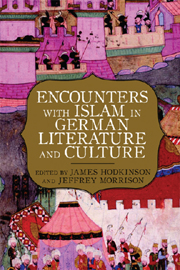Book contents
- Frontmatter
- Contents
- Acknowledgments
- Introduction
- 1 “cristen, ketzer, heiden, jüden”: Questions of Identity in the Middle Ages
- 2 Wolfram von Eschenbach, Islam, and the Crusades
- 3 Perverted Spaces: Boundary Negotiations in Early-Modern Turcica
- 4 Enlightenment Encounters the Islamic and Arabic Worlds: The German “Missing Link” in Said's Orientalist Narrative (Meiners and Herder)
- 5 Goethe, Islam, and the Orient: The Impetus for and Mode of Cultural Encounter in the West-östlicher Divan
- 6 Moving beyond the Binary? Christian-Islamic Encounters and Gender in the Thought and Literature of German Romanticism
- 7 Forms of Encounter with Islam around 1800: The Cases of Johann Hermann von Riedesel and Johann Ludwig Burckhardt
- 8 Displacing Orientalism: Ottoman Jihad, German Imperialism, and the Armenian Genocide
- 9 German-Islamic Literary Interperceptions in Works by Emily Ruete and Emine Sevgi Özdamar
- 10 Dialogues with Islam in the Writings of (Turkish-)German Intellectuals: A Historical Turn?
- 11 Michaela Mihriban Özelsel's Pilgrimage to Mecca: A Journey to Her Inner Self
- 12 Intimacies both Sacred and Profane: Islam in the Work of Emine Sevgi Özdamar, Zafer Şnocak, and Feridun Zaimoğlu
- 13 Encountering Islam at Its Roots: Ilija Trojanow's Zu den heiligen Quellen des Islam
- 14 The Lure of the Loser: On Hans Magnus Enzensberger's Schreckens Männer and Ian Buruma's Murder in Amsterdam
- Notes on the Contributors
- Index
2 - Wolfram von Eschenbach, Islam, and the Crusades
Published online by Cambridge University Press: 05 February 2013
- Frontmatter
- Contents
- Acknowledgments
- Introduction
- 1 “cristen, ketzer, heiden, jüden”: Questions of Identity in the Middle Ages
- 2 Wolfram von Eschenbach, Islam, and the Crusades
- 3 Perverted Spaces: Boundary Negotiations in Early-Modern Turcica
- 4 Enlightenment Encounters the Islamic and Arabic Worlds: The German “Missing Link” in Said's Orientalist Narrative (Meiners and Herder)
- 5 Goethe, Islam, and the Orient: The Impetus for and Mode of Cultural Encounter in the West-östlicher Divan
- 6 Moving beyond the Binary? Christian-Islamic Encounters and Gender in the Thought and Literature of German Romanticism
- 7 Forms of Encounter with Islam around 1800: The Cases of Johann Hermann von Riedesel and Johann Ludwig Burckhardt
- 8 Displacing Orientalism: Ottoman Jihad, German Imperialism, and the Armenian Genocide
- 9 German-Islamic Literary Interperceptions in Works by Emily Ruete and Emine Sevgi Özdamar
- 10 Dialogues with Islam in the Writings of (Turkish-)German Intellectuals: A Historical Turn?
- 11 Michaela Mihriban Özelsel's Pilgrimage to Mecca: A Journey to Her Inner Self
- 12 Intimacies both Sacred and Profane: Islam in the Work of Emine Sevgi Özdamar, Zafer Şnocak, and Feridun Zaimoğlu
- 13 Encountering Islam at Its Roots: Ilija Trojanow's Zu den heiligen Quellen des Islam
- 14 The Lure of the Loser: On Hans Magnus Enzensberger's Schreckens Männer and Ian Buruma's Murder in Amsterdam
- Notes on the Contributors
- Index
Summary
THE VIEW OF THE ORIENT that obtains in Wolfram von Eschenbach's Arthurian romance, Parzival, and in his final, unfinished epic, Willehalm, is unlikely to have stemmed from first-hand experience. While Wolfram had access to Arab learning, probably through the medium of Latin translations, there is no evidence that he ever went to Arab lands. Nevertheless, the Orient and oriental characters play a major role in both narratives, and there is a notable conformity of attitude between the two works, which points to a greater degree of compassion and understanding than might be expected at a time when the crusading ethos was prevalent. Wolfram's use of place-names and proper names that may or may not derive from the Arabic, and the problems of geography, have been tackled elsewhere. The aim of this chapter is to attempt an overview of Wolfram's portrayal of oriental characters and their religion, and the implications of this in the context of the politics of the early thirteenth century.
The first book of Wolfram's Parzival has no parallel in his main source, Chrétien de Troyes's Conte du Graal or Perceval. It sees Gahmuret, Parzival's father, setting off for adventures in the Orient. Gahmuret's goal is to serve “die hœhsten hant,” (13,13; “the Highest Hand on this earth”). He is told of the powerful “bâruc,” the caliph resident in Baldac (Baghdad), to whom two-thirds of the earth are subject, or even more.
- Type
- Chapter
- Information
- Encounters with Islam in German Literature and Culture , pp. 36 - 54Publisher: Boydell & BrewerPrint publication year: 2009

